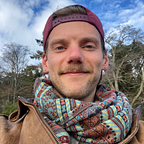Allyship, Decolonization, and Fractals
The Capitol Hill Occupation Protest: Day 6
Allyship is definitely a challenging topic. There is lots of subconscious and implicit bias work that needs to happen. There is the need to empathize and then internalize the experiences of those that walk through life differently than you. There are the challenging questions around why and how you step into antiracist work in the community.
But in some ways, and as usual, our society has over-intellectualized parts of the solution. Parts of White allyship can be easy. Parts can be all be guided by the simple act of asking the question: “How can I support you?”
Think small. Think of the smallest fractal — one person of color, one relationship. Ask them that question, listen, and do whatever they say. Sounds pretty easy right?
They might say that they’d like some space; or for you to stand beside them, or in front of them, or behind them as they rock their shit like a rockstar. It may be a invitation to stand up, take a bit of their never-ending load, and do some of the fighting yourself.
Whatever it is, just ask, truly listen, and let whatever they choose to share with you guide your action.
That listening part is key. Curiously and compassionately listen to their story, their truth, and their fears and dreams with an open heart.
Then help just that one person of color feel like they belong a little bit more in our society and culture. Then once you’re finished, ask someone else. Then again and again until we all transform and liberate our community.
I’m ashamed to admit, to myself even, that I’ve usually had a twinge of fear, anxiety, and trepidation when approaching and building relationships with Black people. Not fear for my life, but socially — of being judged and not accepted, only seen as another white guy or maybe saying the wrong thing or not feeling welcome (or making them feel like they aren’t welcome).
And of course, this is part of what leads to the othering that has pervaded our culture, structures, and is causing the problems we are seeing today.
Personally, without that subconscious fear, approaching this probably would’ve made obvious sense, but there is so much happening in our body and subconscious that it takes a lot of time, openness, and work to be able to touch.
Whenever is happening now, I know I’m on the right place because I feel like I’m speaking from my belly, not my head.
Decolonization Conversation Café.
I love it.
I’ve heard the term decolonization thrown around quite a few times in the past few years, but haven’t fully understood it or put my energy into making sense of it until now.
This morning, I got to thinking deeply about it and it just clicked. (I’m once again grateful to have just trusted Black people in helping guide the shape of our Café even if it takes me a while to catch up.)
Before white Europeans spread throughout the world, they lived on the land that sustained them. Naturally, an interdependent and symbiotic relationship emerged between these communities with their land, resources, and people. But as white Europeans spread, the culture shifted to that of colonizers. This culture naturally manifests as exploitative, extractive, and dominance. Someone’s needs now become supreme to another’s.
Let’s sail to a new place to claim that land, force those people to submit, and then take their resources to call our own.
So not only did this lead to a loss of connection with their own land and commons, but this colonizer culture led to the world’s greatest injustices that we are still failing to repair and heal today. That culture has been passed down to every generation in our country, including mine.
We can directly track it to so many of the things we have all internalized — a scarcity mindset; our obsession with scaling and growth; a focus on competing and winning over cooperation and collaboration.
Everything is take and consume, instead of cultivate and nurture. Relationships and trust devolve towards rules and roles that defer responsibility and agency. Belonging becomes perverted to entitlement. We lose connection with our bodies and the sacred. We’ve built dividing structures around masculine and feminine, race, etc. We’ve allowed generational wealth and power to destroy any semblance of equity.
This is now everyone’s battle, but especially white people’s. And this is what our Café is going to work to dismantle — all through transformative conversations and connections.
And with CHOP being a fractal community experiment within a larger fractal collective (our city), this Café is a smaller fractal within CHOP, full of even smaller fractals small groups in discussion, eventually getting down to the small fractal of individual liberation through relationship and conversation with others.
Another big day ahead of me. Squeezed in a run, packed up some new supplies, and now heading to CHOP to continue this community experiment. Today’s mission is to find artists and some crafty people to help upgrade my signage.
